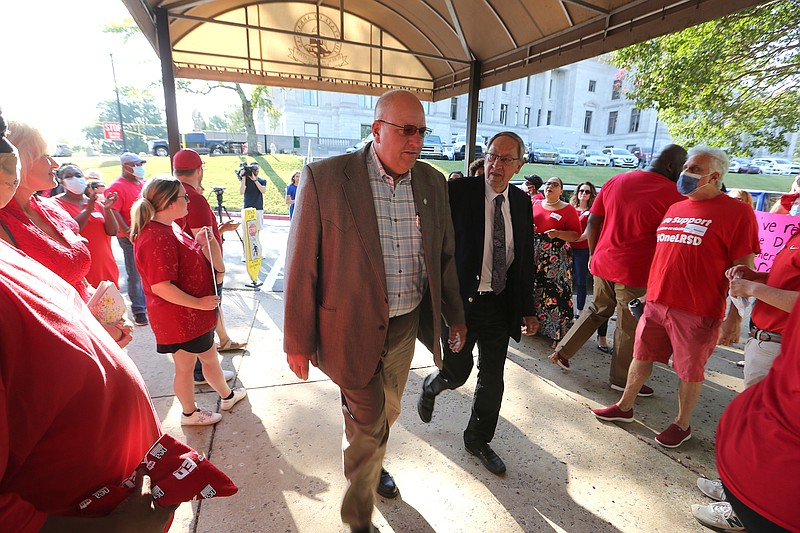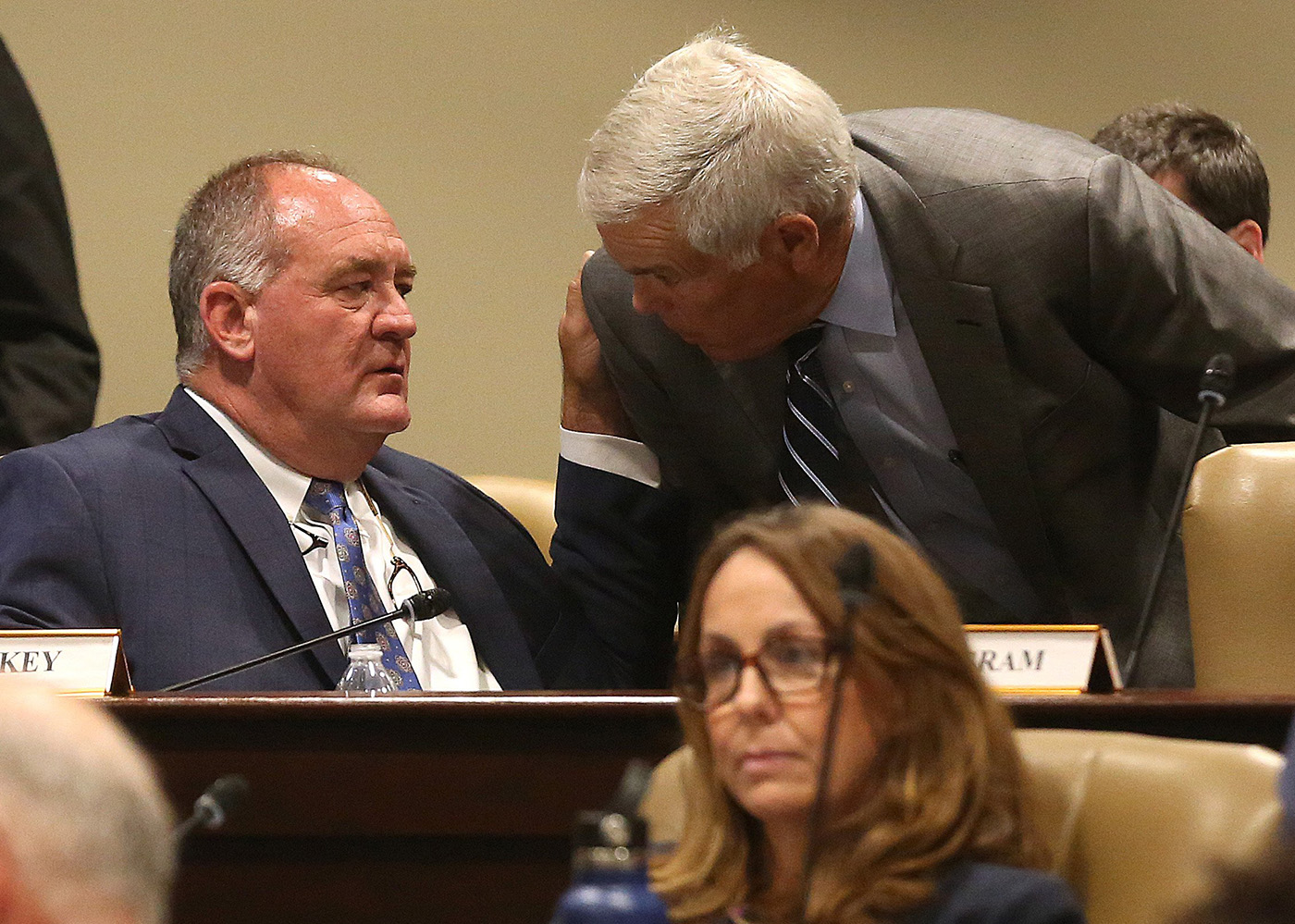The Arkansas Legislative Council on Thursday rescinded its approval last month of $500 million in spending authority for the state Department of Education to disburse funds under the federal American Rescue Plan's Elementary and Secondary Schools Emergency Relief Fund, and instead recommended school districts develop plans to use the federal funds to finance bonuses for teachers and staff.
After nearly two hours of debate, the council voted 41 to 7 to approve a motion by Senate President Pro Tempore Jimmy Hickey, R-Texarkana, to expunge its June 17 approval of spending authority for the disbursal of the funds.
The council recommended the funds be used to give a $5,000 bonus to full-time teachers and a $2,500 bonus to full-time staff, which will be financed with Elementary and Secondary School Emergency Relief funds.
Hickey said if every school gave its teachers and staff a bonus, it shouldn't exceed the $500 million that was approved by the council last month. Hickey said he couldn't give the exact number of how much it would cost if every school followed the recommendation.
Gov. Asa Hutchinson said in a news release he was disappointed by the council's decision because it isn't the best approach to helping teachers. The Republican governor said the decision runs contrary to the council's statutory authority and contrary to principles of separation of powers underlying the Arkansas Revenue Stabilization Act.
"Just as the General Assembly could not recall a bill from my desk that had already been signed into law, ALC may not undo the lawful appropriations under Act 199 through a parliamentary maneuver," Hutchinson said. "Under the appropriation passed last month, the schools could use the funds for teacher bonuses and incentives. The big change now is that the schools must submit plans which must go back to the legislature for additional review.
"In other words, the local school district priorities may not be approved. I am concerned that teachers in some districts will get a bonus, but others may not. The creative approach by the committee today while well-intentioned is not the best approach to helping our teachers."
TEACHER SHORTAGE
Members and supporters of the Arkansas Education Association greeted lawmakers before the meeting with chants of "pay our educators now" as they called on lawmakers to prioritize educator pay increases during the upcoming special session.
"That bonus is a diversion," said Carol Fleming, president of the Arkansas Education Association. "It doesn't address the educator shortage. A bonus doesn't pay the bills next year."
Fleming said she is concerned Thursday's decision means Arkansas will have one of the lowest teacher salaries in the nation for another two years. That, she said, would increase the educator shortage around the state.
"We are dealing with a statewide teacher shortage," Fleming said. "This most recent school session, some schools had to switch to online learning because of the lack of certified educators."
The decision means school districts will have to decide whether to use ESSER funds for bonuses, but each proposed use of the federal funds must receive approval from the Performance Evaluation and Expenditure Review Subcommittee.
Sen. Jim Hendren, an independent from Gravette, expressed concern the decision takes power away from local school boards to make funding decisions.
Hickey said a state law requires state agencies to bring a detailed report to lawmakers on the proposed use of federal American Rescue Plan funds when they request spending authority to use such funds. If school districts choose not to use the money for bonuses, Hickey said, they must state why and then it will be presented to legislators by the Department of Education.
"We anticipate [Department of Education Secretary Johnny] Key will get a lot of requests from school districts that didn't know they can do this," he said. "... This body requested multiple times after we received the [Coronavirus Aid, Relief and Economic Security Act] money that we would look at detailed plans from any and all agencies. It's in our legislation."
Opponents of Hickey's motion said the bonus doesn't address the key issue of low teacher salaries in Arkansas.
"I don't want to keep kicking the can down the road," said House Minority Leader Tippi McCullough, D-Little Rock.
Key pointed out previously that going into the 2022-23 school year, base salaries in Oklahoma, Missouri, Tennessee and Mississippi are all higher than Arkansas, and that Mississippi just increased its base salary to $41,500 along with an approximately $5,000 salary increase for every teacher.
"We're working hard to not face up to raising salaries when we can. Other states have raised their salaries for teachers and used ESSER funding for bonuses," said Sen. Keith Ingram, D-West Memphis.
Hickey said he expects the state will do something for teachers come January after an adequacy review by the House and Senate Educational Committees is completed this fall.
Senate Education Committee Chairwoman Missy Irvin, R-Mountain View, said in the past that the state has worked to address the teacher salary issue and that she is committed to continue looking at options to support educators.
Under Act 170 of 2019, the minimum teacher salary is $34,900 for the 2021-2022 school year and will increase to $36,000 in the 2022-2023 school year.
Rep. Jack Ladyman, R-Jonesboro, said he favored giving bonuses to educators and staff because that is what is needed.
"It seems to me that our leadership needs to give teachers funds right now," he said. "We can discuss [salaries] later, but right now we need to give teachers the money they deserve. We can debate later on these other issues."
SPECIAL SESSION
Rep. Jim Wooten, R-Beebe, called the issue surrounding teacher salaries a mess.
"Forty-two years ago I chaired the first finance commission, and we had the same discussion then that we are hearing today," he said. "I hope for the teachers' sake that we will do something about it and make sure it's done right."
Wooten tried to mention Hutchinson's efforts to put the teacher salary raise on the upcoming special session, but his microphone was turned off because it wasn't the topic being discussed during the meeting.
"I am tired of fooling with this body not addressing the teachers and the needs of the school district," Wooten said loudly enough to be heard without the microphone.
Hutchinson said earlier this month that he wouldn't put a teacher salary increase on the agenda for the special session he intends to call starting Aug. 8 to consider tax cuts because of the lack of support in the Republican-dominated Legislature for a teacher pay increase in the session.
Hutchinson initially proposed raising teacher salaries to a minimum of $46,000 and implementing at least a $4,000 salary increase. Hickey sharply criticized the proposal, saying it would cost $333 million to implement and that would be too costly.
Hutchinson subsequently trimmed his proposal to increase the minimum teacher salary to $42,000 a year and to provide a $4,000 increase to every teacher for the 2022-23 school year.
Total cost of the trimmed-down proposal would be $150 million for fiscal 2023, which started July 15 and ends June 30, 2023, and would come out of the fiscal 2022 surplus, according to Key. For fiscal 2024, the public school fund would need $140 million in ongoing general revenue under the proposal, and the $60 million in additional needed funds would come from combined growth in the educational adequacy fund, educational excellence trust fund and uniform rate of tax.
House and Senate Democrats have signaled they support raising teacher salaries in the special session. Some Republicans also have said they support considering teacher raises in the special session.
Several Republican legislative leaders have said they want to wait for the House and Senate education committees to complete their biennial education adequacy review this fall and consider raising teacher salaries in the 2023 regular session, which starts in January.
Fleming said she wants to see Hutchinson put the teacher salary increase on the agenda for the special session anyway to force legislators to state their position.
"We need to see where legislators stand on the issue," she said. "They always say they support educators, but it's time to prove it."
Chesterfield told the crowd of educators and supporters that she knows some school districts won't be able to afford $5,000 and $2,500 bonuses.
"Which means this is a promise that may or may never come true," she said. "It was essentially used to shut you up. I just say to you today, don't shut up. Don't be quite. Keep fighting for what you know to be right."
Fleming said while long-term funding for increased pay could be addressed during the adequacy process, it's unconscionable to prioritize tax cuts while the state has the lowest-paid teachers in the region and is second-to-last in the nation.
"With a more than $1.6 billion surplus, we have an opportunity to take immediate action to address the shortage of qualified educators in our state," she said. "The way we spend our money reflects our values.
"What could be more important than making sure that our students have the state's top talent running our classrooms? Our students deserve to have highly qualified and highly paid educators in our classrooms."
Gallery: Arkansas Legislative Council

